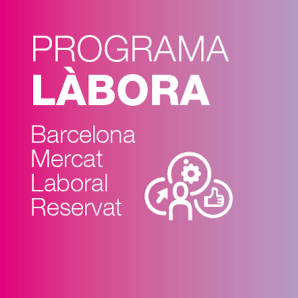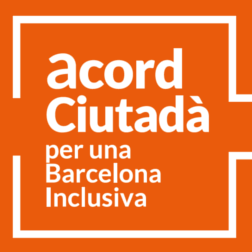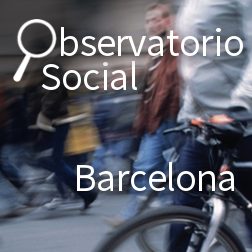Growing up between screens?
16/01/2024 - 15:31
Currently, the presence of screens and digital devices in the daily lives of children and adolescents raises questions about the technological impacts on their development. With the “Growing between screens” series, we explore the challenges and reflections of digitization, focusing on its critical approach and digital rights. Join us in this open space at Canòdrom to delve into these issues!
Nowadays, we find ourselves in an engaging debate on how to address screen exposure and digital device use during childhood and adolescence. The early adoption of technology is raising concerns and prompting reflection on the limits of the current digitization model.
It’s good news that a public debate has opened up, with active participation from schools, governments, social organizations, and the public. This is a complex issue with no easy solutions, but it’s essential that all voices be heard. This is what makes democracy work. Can we identify possible paths for the future?
Education under technological monopoly
The starting point for this new cycle will be on Thursday, February 1, from 6:00 to 7:30 pm with the session OMG, Screens! Technologies at whose service? The first issue we address is understanding how technology operates in the current digital situation. How does technology affect the way children interact with the world? To find out, it’s important to closely examine the digital platforms, tools, and software that shape their experience.
The report “BigTech Digital Platforms of the Catalan Educational System and Children’s Rights: Threats and Challenges (edDIT)” stands out as one of the first studies, both nationally and internationally, that delves into the specific evaluation of how major digital platforms influence the rights of students within the educational system. The study denounces that the “massive and unregulated” use of digital platforms provided by major companies such as Microsoft or Google (also known as big tech) in educational institutions “potentially violates” the rights of children. Among the main conclusions of the research is the existence of a mutual dependency between public education systems and major tech companies.
February 1, 6:00 pm OMG, Screens! Technologies at whose service?
Registration
Impacts on health
The second crucial aspect is the impact on the health of individuals in early and growing ages. Recently, a dialogue has opened up about how constant exposure to electronic screens affects mental health, sleep quality. How can we balance access to technology with the need for healthy physical and mental development?
Screens have ceased to be the future and have become our present. But tablets, computers, mobile phones, smart TVs, video game consoles, e-books, and other state-of-the-art devices are not just technological tools; they have become “another member” and an important part of our lives. According to 2023 data from the Observatory of Childhood, the smartphone has the greatest presence, with an average of 2.8 devices per household.
Meanwhile, the WHO recommends avoiding exposing children under two years of age to screens. It emphasizes that overexposure to excessive use can lead to various health problems, such as a lack of restorative sleep in terms of time and quality, emotional disorders, fatigue, attention deficits, delays in language and cognitive development, among others.
March | Health 2.0: keys to a healthy digital life
More information coming soon
The future of digitization in schools in the hands of ‘Big Tech’
The integration of the digitization model in schools raises another set of questions. How does technology fit into the educational environment? Does it encourage active participation and critical learning, or does it simply perpetuate screen dependence?
We are living in times of change. One of the biggest changes has been the rapid digitization of education due to the COVID-19 pandemic, which has brought new challenges, from homes to classrooms. This process, led by tech giants like Google and Microsoft, though necessary, has raised concerns about the massive extraction of data and information, typical of surveillance capitalism.
The big tech companies have seen education as an endless source of wealth and power. They have created platforms for millions of people worldwide to study from home, and this has given rise to a privacy dilemma, as they collect a lot of data with opacity regarding its use. Nowadays, many primary students already have their Teams or Google Classroom accounts. This is explained in the report “Technology and Human Rights in the Digital Era: Counter-hegemonic Responses” by Intermon Oxfam.
April | Challenges for a digital and democratic school
More information coming soon
Digital gaps and inequalities
A critical point is to assess whether digitization is erasing inequalities or consolidating new digital divides. Does childhood and adolescence have equitable access to technology and the opportunities it offers? It is essential to address these issues from a rights’ perspective.
The current technological model does not take into account economic, social, and cultural realities, and the role assigned to families, students, and teaching staff is that of simple users who have to accept what CEOs of large companies, thousands of kilometers away, design.
In this context, the International Computer and Information Literacy Study (ICILS, 2018), a large-scale international assessment periodically conducted on 13-year-old students, analyzes to what extent they are prepared to study, work, and live in a digital world. The last study involved 46,000 people. The study reveals relevant data to reflect on educational strategies toward digital citizenship:
Only 21% of students demonstrated autonomy and precision in digital tasks, while the 79% remaining needed help, and of these, 18% were unable to execute simple commands. Additionally, the report indicates that the educational digitization strategy, launched in affluent countries in the 80s, has not been quite successful. Considering that it has a similar trajectory to the Catalan educational system, the report “Educational Strategies Toward Digital Citizenship” by the Bofill Foundation suggests that many young people are not adequately prepared to face the challenges of studying, working, and living in a digital world.
May | In the classroom and beyond: inequalities and digitization
More information coming soon
The voice of the protagonists
Finally, to enrich this debate, it is essential to include the voice of the protagonists. Through co-creation sessions, we will try to understand the perspectives of youth, identifying risks and potentialities, and building a digital environment that responds to their needs.










